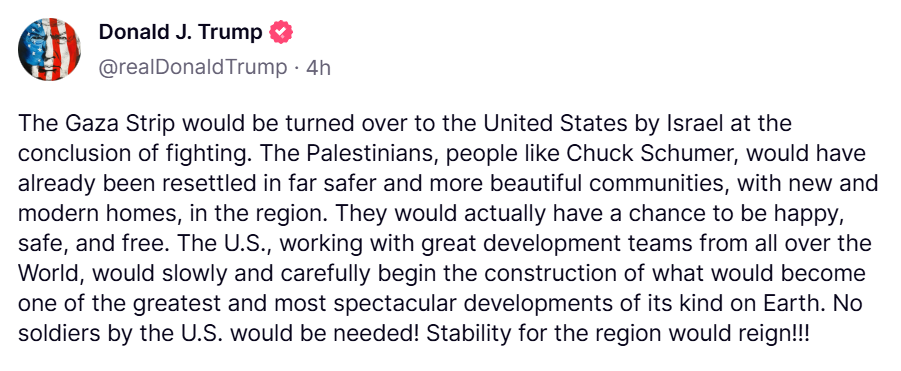President Donald Trump recently outlined his controversial vision for U.S. involvement in the Gaza Strip in a series of social media posts early Thursday morning. The remarks came just hours before a joint press conference with Israeli Prime Minister Benjamin Netanyahu, where Trump revealed his plans to the Israeli leader.
Trump proposed that, after the conclusion of fighting in Gaza, the region would be handed over to the United States by Israel. This idea has raised significant concerns, simplifying the situation in a way that signals to Israel they have U.S. approval to potentially displace the 2 million Palestinians currently residing in Gaza, including thousands of Hamas fighters who are unlikely to comply with such a move.
Trump says, “The Gaza Strip would be turned over to the United States by Israel at the conclusion of fighting. The Palestinians, people like Chuck Schumer, would have already been resettled in far safer and more beautiful communities, with new and modern homes, in the region. They would actually have a chance to be happy, safe, and free. The U.S., working with great development teams from all over the World, would slowly and carefully begin the construction of what would become one of the greatest and most spectacular developments of its kind on Earth. No soldiers by the U.S. would be needed! Stability for the region would reign!!!”

A notable aspect of Trump’s plan is his assertion that U.S. military involvement would not be necessary, a point likely intended to appease Republicans who have criticized American military presence overseas.
However, the plan leaves many questions unanswered, especially regarding the resettlement of millions of Palestinians and where they would go. No Middle Eastern nation has expressed any willingness to accept these displaced individuals, and many countries have voiced strong opposition to the idea.
By providing further details on his vision, Trump has sparked a debate about whether this is a serious proposal or merely a strategic move to gain leverage in ongoing negotiations.







